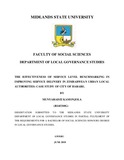Please use this identifier to cite or link to this item:
https://cris.library.msu.ac.zw//handle/11408/4066| Title: | The effectiveness of Service Level Benchmarking in improving service delivery in Zimbabwean urban local authorities. Case of City of Harare | Authors: | Kamonjola, Munyaradzi | Keywords: | service level benchmarking service delivery urban local authorities |
Issue Date: | Jun-2018 | Publisher: | Midlands State University | Abstract: | The study assessed the effectiveness of Service Level Benchmarking in Zimbabwean urban local authorities in improving service delivery, using the case of City of Harare. Service Level Benchmarking is a new concept introduced in local authorities as a panacea to improve service delivery through tracking performance of local authorities over time to see failures and success through reviews by other local authorities. Harare City Council is one of the local authorities practicing Service Level Benchmarking in a bid to improve water supply, waste water management and solid waste management within its areas of jurisdiction. In the introductory chapter the researcher highlighted the background of the study citing reasons for the introduction of service level benchmarking. The statement of the problem inquired whether service level benchmarking has improved the water and sanitation challenges. The ultimate reason of the research was to uproot the reasons for adoption of Service Level Benchmarking, how it is improving service delivery and how effectives has it been in improving service delivery and if this initiative is a solution to improving service delivery. Themes that the study addressed includes history of SLB in Zimbabwe, reasons for its adoption, key elements that SLB is focusing on, Indian case study of SLB as well as the relationship between SLB and service delivery. The research was guided by the Benchmarking Theory and New Public Management Model which attempted to show how benchmarking and factors in new public management can improve service delivery. A qualitative and quantitative research approach was used in the research; for a target population of 65 personnel and a sample of 54 respondents comprising of residents, business community, council officials and SLB focal persons. The researcher used questionnaires and interviews as research instruments. The data collected was analysed and presented in the form of graphs, pie charts, tables, doughnut and bar graphs. The findings showed that City of Harare is improving water and sanitation services as it is ensuring that the performance indicators have increased after every peer review process, this can be noted through improved water supply, improved response to customer complaints, stakeholder involvements, engaging private private partnerships sharing of best practices from peer review processes. The research recommends the council to be implementers of best practices rather than being problem identifier, use of ICT, need for more stakeholder involvement, need for institutionalising of the SLB process and formulate proper guidelines that clearly identifies the issues of SLB funding. | URI: | http://hdl.handle.net/11408/4066 |
| Appears in Collections: | Bsc Local Governance Studies Honours Degree |
Files in This Item:
| File | Description | Size | Format | |
|---|---|---|---|---|
| project zero final PROJECT.pdf | Full Text | 1.17 MB | Adobe PDF |  View/Open |
Page view(s)
246
checked on Feb 24, 2025
Download(s)
204
checked on Feb 24, 2025
Google ScholarTM
Check
Items in MSUIR are protected by copyright, with all rights reserved, unless otherwise indicated.



